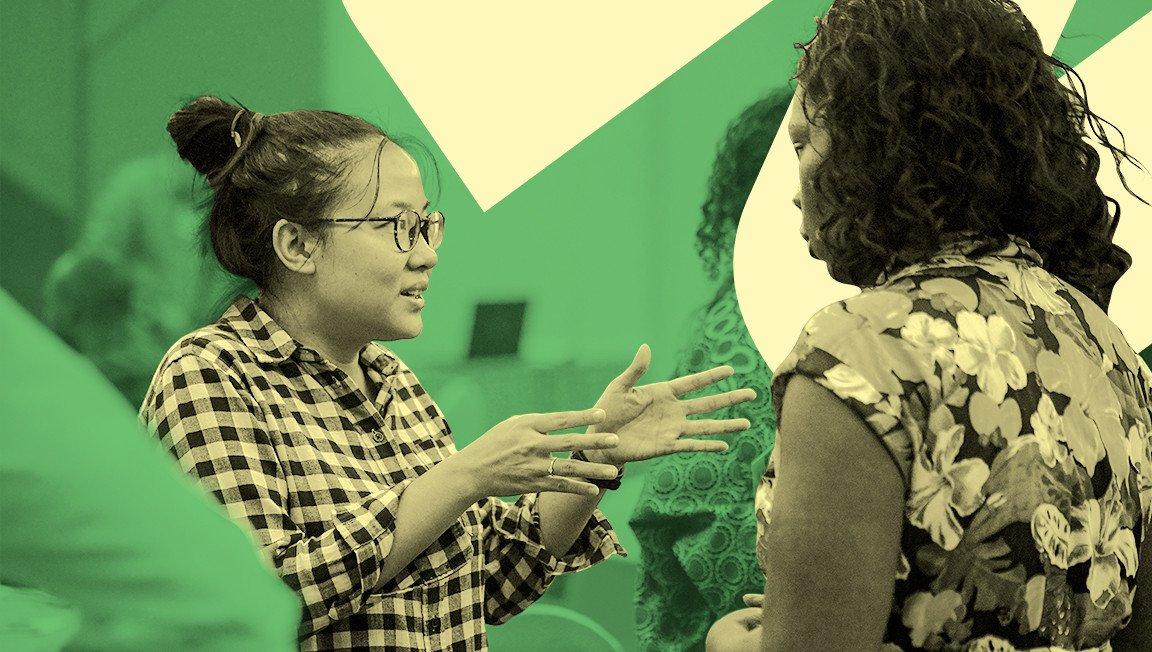We want to champion new conversations with the public about health
Wellcome wants to promote new practices in public dialogue to involve a broader, more diverse range of people in discussions about health challenges and how we face them.

We think that a collective approach between different spheres – academic, civic, private and public – will lead to the faster, more far-reaching changes needed to tackle the most important health issues facing us all.
One collective approach is ‘deliberative dialogue’ – by which we mean a two-way conversation that brings together different perspectives and puts them into context. The Citizen Assembly is a form of this, which in Ireland has even brought about constitutional change.
Deliberative dialogue is growing across different sectors. For example, it is being used in patient engagement to help deliver better health services, and by the government to help determine policy decisions around science and technology.
Deliberative dialogue has the potential to paint a picture of public response that is representative of a wide range of voices, while having clear outcomes in terms of policy impact. This makes it an attractive mechanism for us to promote across some of the most pressing health issues.
The first we are addressing is one of the world’s most critical – antimicrobial resistance. At present, while policy makers are discussing the problem, there is little public dialogue about antimicrobial resistance anywhere in the world. We think that a public mandate for change around antimicrobial use would increase the likelihood of substantial policy change and meaningful action at a local level.
A deliberative dialogue that could identify public priorities around antibiotic use would benefit the public, policy makers and funders alike. We are currently exploring different models for a dialogue and assessing the potential of pilot dialogues in cities internationally. The aim is to both empower different people while making clear policy asks created by members of the public.
The challenges of public dialogue practices
Large-scale deliberative practices are not frequently seen in the health and science sector. We think this is because public dialogue practices are:
- expensive and resource intensive
- difficult to deliver from end-to-end
- their impact is hard to measure
- they require multiple partners and organisations to conduct the dialogue and affect change.
Plus, their value is not widely communicated to the health and science sector.
Our initial landscape research found that the impact of public dialogue projects varied. Those with a clear call for change or informing decision-makers empowered participants as it ensured their voice was heard.
Dialogues that have already been tried
- Sciencewise supports UK government bodies to run public dialogues on issues relating to science and technology. It only supports projects in areas where there is a clear commitment to the project findings informing policy development. They continue to track projects to ensure this happens. They’ve made all their outcomes and impacts available online to illustrate this.
- Nossas, a Brazilian not-for-profit organisation, combines online and offline engagement tools to support and empower citizens to improve life in their communities. Since its foundation in Rio de Janeiro 2011, Nossas has grown to create projects and networks in nearly a dozen Brazilian cities and has engaged hundreds of thousands of people, changing over 100 public policies.
- The Alberta Climate Change Dialogue ran public dialogues to increase Albertans’ understanding of different elements of climate change. The dialogues aimed to empower citizens to make recommendations to municipal and provincial governments on climate change policy. The project explored the impact these deliberations had on policy outcomes and citizen views. In their reflections on the process, the team highlighted the importance of diversity and inclusion in public deliberation and recognised the project "had mixed success in building deliberations that both reflected and included multiple forms of social diversity".
What we hope to achieve
Learning from past deliberate dialogues, we want to support the development of public dialogue practice that is outcome focused, representative and diverse, repeatable, iterative and scalable.
Championing deliberative dialogue is a fresh approach for Wellcome. We hope that by being pioneers in the sector we can amplify the influence of the public voice on health research and health outcomes more widely.
If you have had experiences of deliberative dialogue, or have views on our plans, we would love to hear from you. Email me at l.mcdowell@wellcome.org.
Related links
Related news
